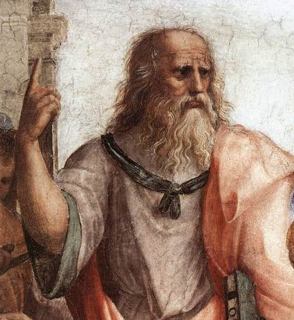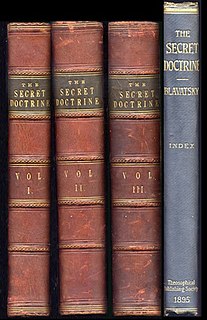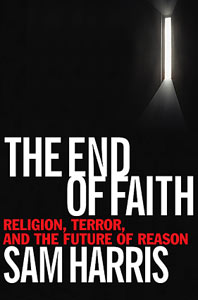Animism is the belief that objects, places, and creatures all possess a distinct spiritual essence. Potentially, animism perceives all things—animals, plants, rocks, rivers, weather systems, human handiwork, and perhaps even words—as animated and alive. Animism is used in the anthropology of religion as a term for the belief system of many indigenous peoples, especially in contrast to the relatively more recent development of organised religions.

In philosophy, idealism is a diverse group of metaphysical views which all assert that "reality" is in some way indistinguishable or inseparable from human perception and/or understanding, that it is in some sense mentally constructed, or that it is otherwise closely connected to ideas. In contemporary scholarship, traditional idealist views are generally divided into two groups. Subjective idealism takes as its starting point that objects only exist to the extent that they are perceived by someone. Objective idealism posits the existence of an objective consciousness which exists before and, in some sense, independently of human consciousness, thereby bringing about the existence of objects independently of human minds. Insights from modern quantum mechanics are generally supportive of objective idealism and provide evidence for the creative function of consciousness at the moment of first observation and wave function collapse.

Reason is the capacity of consciously applying logic to seek truth and draw conclusions from new or existing information. It is closely associated with such characteristically human activities as philosophy, science, language, mathematics, and art, and is normally considered to be a distinguishing ability possessed by humans. Reason is sometimes referred to as rationality.
Zecharia Sitchin was an author of books proposing an explanation for human origins involving ancient astronauts. Sitchin attributed the creation of the ancient Sumerian culture to the Anunnaki, which he stated was a race of extraterrestrials from a planet beyond Neptune called Nibiru. He asserted that Sumerian mythology suggests that this hypothetical planet of Nibiru is in an elongated, 3,600-year-long elliptical orbit around the sun. Sitchin's books have sold millions of copies worldwide and have been translated into more than 25 languages.

Immortality is eternal life, being exempt from death; unending existence. Some modern species may possess biological immortality.

Kenneth Earl Wilber II is an American philosopher and writer on transpersonal psychology and his own integral theory, a philosophy which suggests the synthesis of all human knowledge and experience.

The Birth of Tragedy from the Spirit of Music is an 1872 work of dramatic theory by the German philosopher Friedrich Nietzsche. It was reissued in 1886 as The Birth of Tragedy, Or: Hellenism and Pessimism. The later edition contained a prefatory essay, "An Attempt at Self-Criticism", wherein Nietzsche commented on this earliest book.

Giulio Cesare Andrea Evola, better known as Julius Evola, was an Italian philosopher, poet, painter, antisemitic conspiracy theorist, esotericist, and occultist. He has been described as a "fascist intellectual", a "radical traditionalist", "antiegalitarian, antiliberal, antidemocratic, and antipopular", and as having been "the leading philosopher of Europe's neofascist movement".
The relationship between Buddhism and science is a subject of contemporary discussion and debate among Buddhists, scientists and scholars of Buddhism. Historically, Buddhism encompasses many types of beliefs, traditions and practices, so it is difficult to assert any single "Buddhism" in relation to science. Similarly, the issue of what "science" refers to remains a subject of debate, and there is no single view on this issue. Those who compare science with Buddhism may use "science" to refer to "a method of sober and rational investigation" or may refer to specific scientific theories, methods or technologies.

"Ancient astronauts" refers to the hypothesis, often presented in a pseudoscientific way, that intelligent extraterrestrial beings visited Earth and made contact with humans in antiquity and prehistoric times. Proponents suggest that this contact influenced the development of modern cultures, technologies, religions, and human biology. A common position is that deities from most, if not all, religions are extraterrestrial in origin, and that advanced technologies brought to Earth by ancient astronauts were interpreted as evidence of divine status by early humans.
The existence of God is a subject of debate in the philosophy of religion and popular culture. A wide variety of arguments for and against the existence of God can be categorized as metaphysical, logical, empirical, subjective or scientific. In philosophical terms, the question of the existence of God involves the disciplines of epistemology and ontology and the theory of value.
Rational emotive behavior therapy (REBT), previously called rational therapy and rational emotive therapy, is an active-directive, philosophically and empirically based psychotherapy, the aim of which is to resolve emotional and behavioral problems and disturbances and to help people to lead happier and more fulfilling lives.

The Secret Doctrine, the Synthesis of Science, Religion and Philosophy, is a pseudo-scientific esoteric book originally published as two volumes in 1888 written by Helena Blavatsky. The first volume is named Cosmogenesis, the second Anthropogenesis. It was an influential example of the revival of interest in esoteric and occult ideas in the modern age, in particular because of its claim to reconcile ancient eastern wisdom with modern science.
James Hillman was an American psychologist. He studied at, and then guided studies for, the C.G. Jung Institute in Zurich. He founded a movement toward archetypal psychology and retired into private practice, writing and traveling to lecture, until his death at his home in Connecticut.

The Myth of the Twentieth Century is a 1930 book by Alfred Rosenberg, one of the principal ideologues of the Nazi Party and editor of the Nazi paper Völkischer Beobachter. The titular "myth" is "the myth of blood, which under the sign of the swastika unchains the racial world-revolution. It is the awakening of the race-soul, which after long sleep victoriously ends the race chaos."

The End of Faith: Religion, Terror, and the Future of Reason is a 2004 book by Sam Harris, concerning organized religion, the clash between religious faith and rational thought, and the problem of intolerance that correlates with religious fundamentalism.
Regression, according to psychoanalyst Sigmund Freud, is a defense mechanism leading to the temporary or long-term reversion of the ego to an earlier stage of development rather than handling unacceptable impulses more adaptively. In psychoanalytic theory, regression occurs when an individual's personality reverts to an earlier stage of development, adopting more childish mannerisms.
Creationism is a doctrine held by some Christians that God creates a soul for each body that is generated. Alternative Christian views on the origin of souls are traducianism and also the idea of a pre-existence of the soul. The Scholastic philosophers held the theory of Creationism.
Contemporary debates about animal welfare and animal rights can be traced back to the ancient world. Records from as early as the 6th century before the common era (BCE) include discussions of animal ethics in Jain and Greek texts. The relations between humans and nonnhumans are also discussed in the books of Exodus and Genesis, Judeo-Christian writings from the 6th or 5th century BCE.

The Passion of the Western Mind: Understanding the Ideas That Have Shaped Our World View is a 1991 book by the cultural historian Richard Tarnas.










